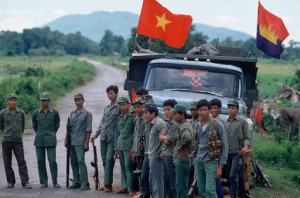បានស្តាប់ពត៌មានវិទ្យុអាស៊ីសេរីនៅថ្ងៃនេះ ខ្ញុំសូមចូលរួមយោបល់ដូចតទៅ៖

ខ្ញុំជាក្មេងជំនាន់ក្រោយនៃរបបប្រល័យពូជសាសន៏ ខ្ញុំសូមចូលរួមយ៉ាងពេញទំហឹងនូវ ការទទួលរងទុក្ក្ខវេទនារបស់ឳពុកម្តាយបងប្អូនរបស់យើងទាំងអស់គ្នា។ ខ្ញុំក៏សូមចូលរួមរំលែកទុក្ក្ខជាមួយលោកប៊ូ ម៉េងផងដែរនៅពេលនេះ។
តែអ្វីដែលខ្ញុំសូមចូលរួមយោបល់និងយោងតាមឯកសារស្រាវជ្រាវនៅសកលវិទ្យាល័យដែលខ្ញុំបានសិក្សារៀនសូត្រ បានកត់សំគាល់ឃើញថាក្រុមខ្មែរក្រហមព្រមទាំងប្រជាជនខ្មែរទូទាំង ប្រទេសគឺគ្រាន់តែជាតួល្អ្ខោននៅក្នុងរឿងវាលពិឃាតមួយតែប៉ុណ្ណោះ។ ប្រវត្តិសាស្រ្តបញ្ជាក់ថា ពេលដែលអាមេរិកមានវត្តមាននៅវៀតណាមខាងត្បូង ចិន និង សហភាពសូវៀត បានចាប់ដៃគ្នាប្រឆាំងលោកខាងលិចយ៉ាងពេញទំហឹង។ ហូ ជីមិញ ជាមនុស្សតែម្នាក់គត់ដែល ត្រូវបានគេទុកចិត្តយ៉ាងខ្លាំង។ មេដឹកនាំប៉ុលពតគឺគ្រាន់តែជាកូនសិស្សហ្វឹកហាត់ពីកិច្ចការ ធ្វើបដិវត្តកុម្មុយនីសរបស់ហូជីមិញតែប៉ុណ្នោះ។ ត្រង់ចំណុចនេះ ទាំងលោកវ៉ាន់ឌីកាអុន ទាំងលោកស្ទីហ្វិនម៉ូរីសបញ្ជាក់ថា ប៉ុល ពត បានព្យាយាមគ្រប់មធ្យោបាយដើម្បី សុំជំនួយដោយត្រង់ពីប្រទេសចិន ប៉ុន្តែចិនបានប្រាប់អោយទៅទទូលជំនួយតាមរយះហូជីមិញ តែប៉ុណ្ណោះ។ ករណីនេះ ដោយសារប្រជាប្រីយភាពសមេ្តចសីហនុ ទើបខ្មែរក្រហមអាចវាយ ឈ្នះលន់ណុលនៅថ្ងៃ១៧ មេសា ១៩៧៥ មុនវៀតណាមខាងជើងវាយរំដោះបានទីក្រុងព្រៃ នគរនៅថ្ងៃទី៣០ មេសា ១៩៧៥។
យើងអាចនិយាយបានថា ដោយសារតែការខ្វះសមត្ថភាពរបស់ក្រុមអ្នកដឹកនាំខ្មែរក្រហម បានជារដ្ឋាភិបាលរបស់ពួកគេបរាជ័យ ទាំងការគ្រប់គ្រងសេដ្ឋកិច្ច សង្គម នយោបាយ និងការបែងបាក់ផ្ទៃក្នុងរហូតដល់មានការសំឡាប់សងសឹកគ្នាយ៉ាងអនាធិបតេយ្យ។
ករណីទីពីរ គឺប្រាកដជាមានការរួមផ្សំគំនិតនិងការបង្កប់ស៊ីរូងផ្ទៃក្នុងរបស់វៀតណាម។ កត្តាខាងក្រោម នេះគឺជាគំនិតស្រាវជ្រាវមួយចំនួនដែលគួរអោយពិចារណា៖
១. នៅពេលដែលវៀតណាមបានទទួលការគាំទ្រយ៉ាងពេញទំហឹងពីចិននិងសហភាពសូវៀត ហើយក្រុមខ្មែរក្រហមគ្រាន់តែជាតួអង្គតូចមួយដូចជាឡាវដែរនោះ មានន័យថាវៀតណាម អាចធ្វើកិច្ចការគ្រប់បែបយ៉ាងបំពេញមហិច្ឆតារបស់ខ្លួន។ វៀតណាមអាចបង្កប់ភ្នាក់ងារឬកង កំឡាំងប្រដាប់អាវុធរបស់ខ្លួនក្នុងជួរកម្មាភិបាលខ្មែរក្រហម។ វៀតណាមអាចដាក់សំពាធគ្រប់ បែបយ៉ាងមកលើក្រុមមេដឹកនាំខ្មែរក្រហមទាំងផ្នែកភស្តុភារ អាវុធគ្រប់ធុន គោលនយោបាយ ទាំងការគ្រប់គ្រងដោយត្រង់ និងដោយប្រយោល។
២. ប្រការដែលខ្មែរក្រហមអាចវាយរំដោះទីក្រុងភ្នំពេញមុនទីក្រុងព្រៃនគរចំនួន១៣ថ្ងៃ គឺជាការ តាំងចិត្តមុតមាំរបស់ប៉ុលពតក្រោមការជួយគាំទ្រផ្នែកប្រជាប្រីយនយោបាយរបស់សម្តេច សីហនុ។ ចំណុចនេះ មេដឹកនាំខ្មែរក្រហមភ័យស្លន់ស្លោថា បើមិនបានរំដោះមុនទេ វៀតណាមនឹងឈ្លានពានកម្ពុជាបន្តាប់ពីគេរំដោះបានព្រៃនគរហើយ។ តែតាមពិតទៅ កងទ័ពវៀតណាមបានចូល មករស់នៅប្រទេសកម្ពុជានិងប្រើប្រាស់ទឹកដីកម្ពុជាតាំង ពីពេលដែលផ្លូវលំហូជីមិញត្រូវបាន គេអនុញ្ញាត។
៣. យើងទទួលស្គាល់គ្រប់គ្នាដែរថា កងទ័ពវៀតណាមចូលឈ្លានពានកម្ពុជានិងវាយលុក បណ្តេញពួកខ្មែរក្រហមបានយ៉ាងស្រួលឬអាចនិយាយបានថាវៀតណាមបានសំរេចនូវ យុទ្ធសាស្រ្តគ្រប់យ៉ាងរបស់ខ្លួនរួចទៅហើយ។ ជាទ្រឹស្តីនយោបាយ វៀតណាមត្រូវតែរៀបចំ រចនាសម្ព័ន្ធនយោបាយ អោយមានរដ្ឋាភិបាលខ្មែរដឹកនាំខ្មែរ។
៤. អ្វីដែលប្រជាជនខ្ន្មែរកត់សំគាល់មុនពេលវៀតណាមវាយលុកចូល គឺម្នាក់ៗអស់សង្ឃឹម ក្នុងជីវិតរួចទៅហើយ ទាំងការស្លាប់ស្រស់ៗនៅចំពោះមុខ ទាំងការបំភ័យដោយមានអន្លង់ ជាត់ទឹកបាយត្រូវបានគេជីកនៅគ្រប់ភូមិជាដើម។ យុទ្ធជនខ្មែរក្រហមបានប្រមូលសម្បតិ ជាតិមានមាសពេជ្រកែវកងនិងរបស់មានតំលៃគ្រប់យ៉ាង គរទុកមួយដុំៗយ៉ាងល្អសំរាប់វៀត ណាមដឹកទៅប្រទេសគេយ៉ាងងាយស្រួល។ មានមតិខ្លះនិយាយថា ឯកសារនៅគុកទួលស្លែង ត្រូវបានគេកែច្នៃនិងផ្លាស់ប្តូរអស់ តែមជ្ឈមណ្ឌលកម្ពុជាអាចនឹងមានចំឡើយល្អជាងនេះ។
ជាការសោកស្តាយ ដែលមេដឹកនាំសំខាន់ៗដូចជានួន ជា ខៀវសំផន អៀងសារី ជាដើម ដែល តែងតែមិនហ៊ានទទួលខុសត្រូវនូវចំពោះមុខតុលាការខ្មែរក្រហម។ នេះអាចជាការ ដោះសារយក លេសរួចខ្លួនឬអាចជាការពិតដែលពួកគេមើលមិនឃើញនៅពេល ដែលមានអំណាចយ៉ាងធូររលុងនៅក្នុងដៃ។
ក្នុងនាមកូនខ្មែរ យើងអាចសន្និដ្ឋានបានថា ទាំងអាមេរិក ទាំងចិន ទាំងរុស៊្សី សុទ្ធតែជាប់ ពាក់ព័ន្ធ នឹងរឿងល្ខោនវាលពិឃាតនៅកម្ពុជាទាំងអស់ ប៉ុន្តែវៀតណាមបានលូកដៃចូល យ៉ាងជ្រៅជាងគេបង្អស់ ហើយវត្តមានកងទ័រវៀតណាមនៅកម្ពុជារាប់សែននាក់ អស់រយះពេលជិត១០ឆ្នាំ និងកេរតំណែលរបស់វៀតណាមនៅកម្ពុជាតាមរយះ គណបក្សប្រជាជនកម្ពុជាសព្វថ្ងៃ គឺជារឿងអាម៉ាស់មួយសំរាប់ទាំងកម្ពុជានិងវៀតណាម សំរាប់ការវិវត្តន៍នយោបាយពិភពលោកនាយុគបច្ចុប្បន្ន។




